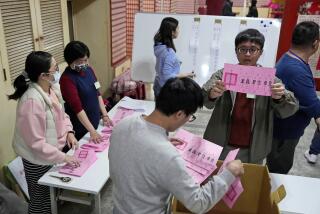Everyone Knows
- Share via
Someday there will almost certainly be a monument to the memory of the young people who were killed in Beijing’s Tian An Men Square because they dared to ask for a little more freedom. Perhaps it will be based on the crudely constructed Goddess of Democracy statue that briefly stood as the symbol of the protesters’ political longings, until Chinese army tanks crushed it into dust. That hope, though, is for a brighter future. In today’s grim present, the men who ordered the massacre in Beijing two weeks ago have commanded that the evidence and even the very memory of that carnage be erased. What the world is seeing in consequence is an act of denial and fabrication that is staggering in its audaciousness.
It has now become a crime in China--the crime of “spreading rumors”--to repeat even what the regime itself had acknowledged until a few days ago, that hundreds of protesters died in Tian An Men Square. The official story instead has become that no one died, and that all evidence to the contrary--including videotape and eyewitness accounts--”distort the truth,” as a Chinese spokesman told NBC. A number of foreign correspondents who were taken on a tour of the square heard the same thing. The burned vehicles and debris that were the visible signs of conflict are gone. But what of the bloodstains and bullet holes that can still be plainly seen? “There was no such thing as bloodshed on Tian An Men Square,” Gen. Li Zhiyung insisted to the reporters.
Can China’s rulers really believe that anyone is fooled by this effort to brazen things out? The world knows what it saw and heard, and knowing is not inclined soon to forgive. That is bad news for China, not alone for the political isolation it imposes but particularly for the economic penalties it encourages. As one Western businessman put it, a regime that lies so flagrantly about what it did to its own people will have trouble being trusted when it gives its word to foreigners. A lot of deals between China and the West that two months ago seemed set now stand postponed or canceled.
Yet China desperately needs to see continued growth in foreign investment, trade, credits, tourism. Its economy, still hobbled in many areas by rigid controls, has reached a crisis stage as inflation increases, unemployment spreads, tax receipts fall and corruption mounts. Expanding its economic ties with other countries wouldn’t by themselves prevent stagnation and regression. But without continuing help from the West, economic conditions seem certain to worsen. Chinese leaders are worried about maintaining their control. Those worries can only be deepened by the economic prospects their actions invited.
More to Read
Sign up for Essential California
The most important California stories and recommendations in your inbox every morning.
You may occasionally receive promotional content from the Los Angeles Times.













